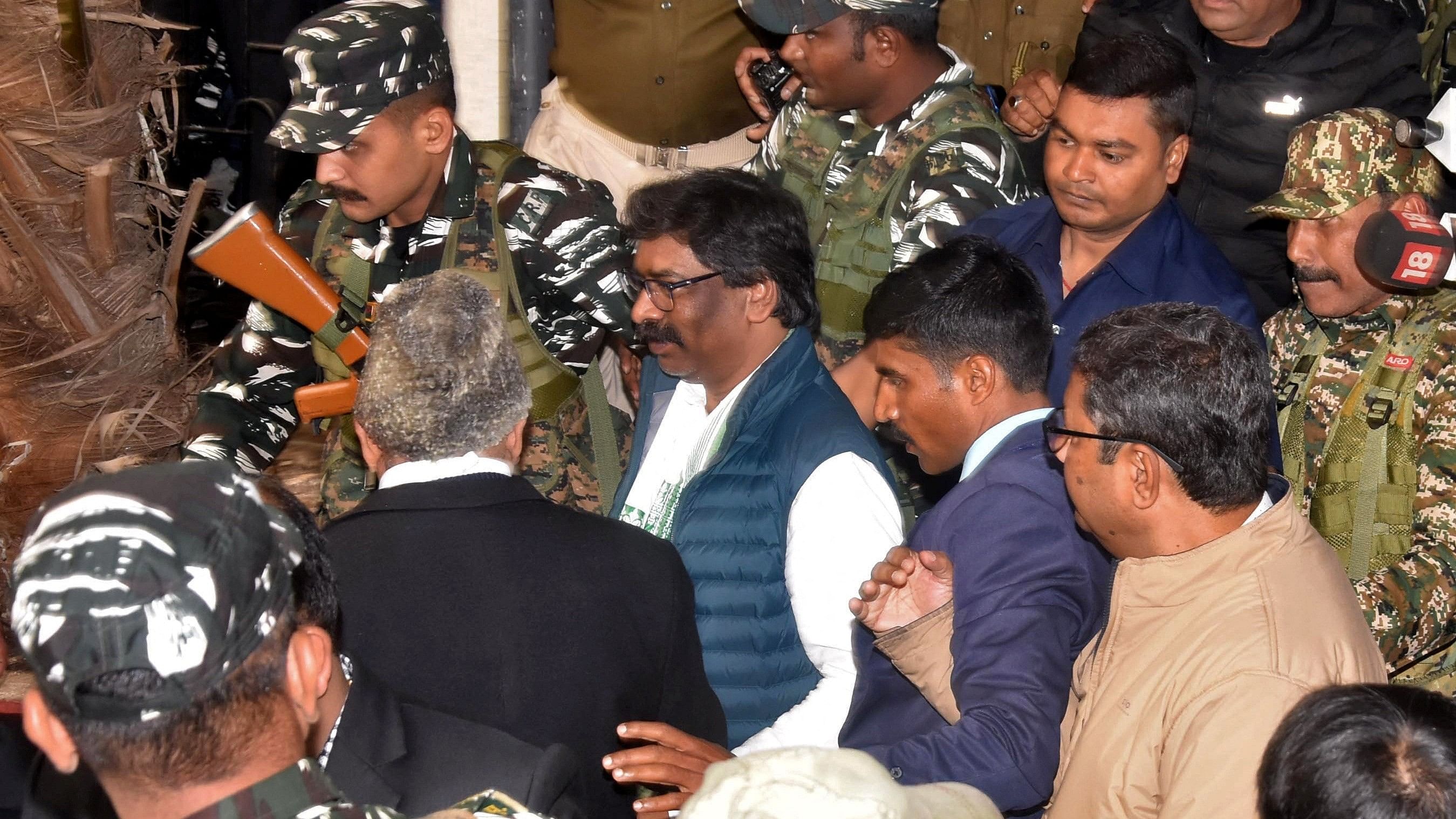
Hemant Soren, former chief minister of Jharkhand, is escorted by security personnel as he leaves court following his arrest late Wednesday.
Credit: Reuters Photo
On February 5, the coalition government in Jharkhand comfortably survived the trust vote necessitated by the arrest of Hemant Soren, the former Chief Minister. Unsurprisingly, the new government led by veteran Jharkhand Mukti Morcha (JMM) leader Champai Soren got the 47 votes it had counted on. We'll come to the numbers in a while.
The fortunes of the Indian National Developmental Inclusive Alliance (I.N.D.I.A.) seem to be connected at this stage of electoral preparations to political developments in eastern India, where Congress leader Rahul Gandhi’s Bharat Jodo Nyay Yatra (BJNY) has experienced a mixed reception.
The BJNY’s patchy fortunes are emblematic of the way the Opposition bloc’s momentum has been hijacked. The biggest setback has, of course, been Janata Dal (United) chief Nitish Kumar’s second mid-term somersault away from the Mahagathbandhan. This is the most consequential development for I.N.D.I.A. and it sets the scene for whatever is to follow. Too much has been written on Kumar’s latest flip to say anything interesting about it anymore.
But, against the grain, it is at least conceivable that its salience may have been a touch exaggerated. If you look at the politics of eastern India, you find that there is no unifying dynamic, contrastively to northern India where the administrative units that masquerade as separate states, follow political patterns that are similar and move to electoral drumbeats that resonate because social configurations cross state borders.
West Bengal, Bihar, Jharkhand, and Odisha have different demographic patterns when it comes to caste, religion, language, and other metrics. Since 1967, when the Congress hegemony received its first blow, they have not moved in lockstep. Jharkhand was created in 2000 and has had a separate dynamic since.
This is not just a long-winded way of saying that Kumar’s defection will not have an impact on the 77 Lok Sabha seats that Jharkhand, West Bengal, and Orissa combined, but also point to the possibility that influences that may exist between states in the region are reciprocal.
In other words, the potentially most consequential event that has happened in eastern India since Kumar’s acrobatics, Hemant Soren's arrest, can create a dynamic that is unlikely to reinforce that set up by the Bihar floor show.
Let us dwell on the timing of Soren’s arrest and the possible calculations the Bharatiya Janata Party (BJP) ‘think’ tank made before unleashing the Enforcement Directorate. Jharkhand is slated to hold assembly elections by December. Last term, the JMM won 30 seats, up 11; the Congress won 16, up 10; and the Rashtriya Janata Dal (RJD) one, up one. They had a pre-election alliance and formed the government, with the support of one member of the Communist Party of India (Marxist-Leninist), Liberation Group, and the Jharkhand Vikas Morcha member, eventually. It’s a solid government in terms of numbers, and it's unlikely the BJP will be able to destabilise it while preparing for the general elections.
Even after the elections, it will have no more than four or five months before assembly elections are to be held. The arrest is, therefore, quite incomprehensible, especially when you factor in the 2019 Lok Sabha elections, in which the BJP, in alliance with the All Jharkhand Students Union (AJSU), won 12 of the 14 seats. Going solo in the following assembly elections cost it badly.
The BJP, counter-intuitively, given its countrywide outreach, doesn’t seem to set much store by the tribal community in areas dominated by tribals — thus, its cold-shouldering of AJSU, and its picking a non-tribal chief minister, in Raghubar Das, in 2014. Now, Soren’s witch-hunt could turn the tribal votes against it. A statewide bandh called by tribal groups was cancelled, but only to pre-empt the possibility of the BJP using it to intensify the witch-hunt.
We don’t know what specific calculation prompted the arrest; there is, of course, the general propensity of the duumvirate that runs the BJP and the country to pursue its goal of a one-party state. What we do know is that it has helped the Opposition greatly. First, there is the possibility of both a tribal and a Jharkhandi backlash; the latter of the kind that greets the imposition of President’s Rule.
Second, Hemant Soren’s arrest has re-invigorated an Opposition jolted by Kumar’s defection. I.N.D.I.A. leaders are more confident they can mobilise and coalesce around this issue instead of being paralysed by Kumar’s exit.
Given multiple dynamics playing out in eastern India, I.N.D.I.A. should be confident of containing its effects within Bihar, and possibly even pull a few of the Mahagathbandhan’s chestnuts out of the fire in a state where it got just one seat in 2019.
(Suhit K Sen is author of ‘The Paradox of Populism: The Indira Gandhi Years, 1966-1977’.)
Disclaimer: The views expressed above are the author's own. They do not necessarily reflect the views of DH.